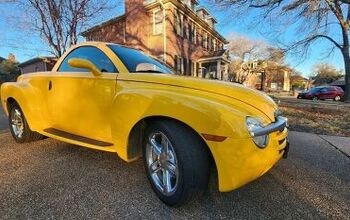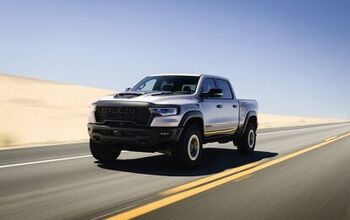Sedans and Missiles: Hyundai Slams Into Another Sales Roadblock

The frustration never seems to end for Hyundai executives. After last year’s Korean labor strife and political scandal, the brand now faces flagging fortunes in the all-important North American market, all thanks to a car-heavy lineup that once guaranteed piles of profit.
Now, the automaker faces the same problem in another global growth engine — China. While that market has also discovered its love for crossovers and SUVs, there’s another problem that Hyundai can’t turn around by rushing a new vehicle to production. Hyundai, it seems, can’t do a damn thing about high-altitude defensive missiles.
Already battered by the Chinese crossover craze — which has seen competitors like General Motors clean up — Hyundai has become a victim of geopolitics.
Anti-Korean sentiment is nothing new to China, but the growing distrust and boycotting of South Korean products — a practice tacitly encouraged by the country’s Communist government — has hit a new high. In response to the nuclear ambitions of North Korea, a key Chinese ally, the South is literally on the defensive. Recently, news emerged that South Korea plans to deploy a U.S.-supplied Terminal High Altitude Area Defense (THAAD) missile battery.
With the first pieces of the missile shield now in place, the system should be fully operational by the end of the year. China isn’t pleased.
According to Bloomberg, Hyundai showrooms in the largest Chinese cities are ghost towns. A manager in a Shanghai dealership told the news agency that weekends will go by without a single person entering the showroom, and that half of his sales staff have already quit.
Reuters reports Hyundai and Kia sales fell a staggering 52 percent in March, year-over-year, as the boycott ramped up. Market share has shrunk to just 3.5 percent. As the automaker counts on China for about a quarter of its overseas sales, the THAAD battery keeping its Seoul headquarters safe from nuclear annihilation won’t save it from that incoming blow. Still, the company persists.
Hyundai plans to offer seven new China-only vehicles, including a gas-powered and electric SUV, to lure Chinese buyers into showrooms. Doing its part, Kia also has a China-only SUV the way.
Beijing Hyundai Motor Company executive Chang Won-shin holds out hopes that anti-Korean sentiment will blow over, telling Bloomberg he expects the business climate to “get better soon.” The company is expected to drop its first-quarter financial report later today, with Kia’s results coming tomorrow.

More by Steph Willems
Latest Car Reviews
Read moreLatest Product Reviews
Read moreRecent Comments
- Bill Wade I was driving a new Subaru a few weeks ago on I-10 near Tucson and it suddenly decided to slam on the brakes from a tumbleweed blowing across the highway. I just about had a heart attack while it nearly threw my mom through the windshield and dumped our grocery bags all over the place. It seems like a bad idea to me, the tech isn't ready.
- FreedMike I don't get the business case for these plug-in hybrid Jeep off roaders. They're a LOT more expensive (almost fourteen grand for the four-door Wrangler) and still get lousy MPG. They're certainly quick, but the last thing the Wrangler - one of the most obtuse-handling vehicles you can buy - needs is MOOOAAAARRRR POWER. In my neck of the woods, where off-road vehicles are big, the only 4Xe models I see of the wrangler wear fleet (rental) plates. What's the point? Wrangler sales have taken a massive plunge the last few years - why doesn't Jeep focus on affordability and value versus tech that only a very small part of its' buyer base would appreciate?
- Bill Wade I think about my dealer who was clueless about uConnect updates and still can't fix station presets disappearing and the manufacturers want me to trust them and their dealers to address any self driving concerns when they can't fix a simple radio?Right.
- FreedMike I don't think they work very well, so yeah...I'm afraid of them. And as many have pointed out, human drivers tend to be so bad that they are also worthy of being feared; that's true, but if that's the case, why add one more layer of bad drivers into the mix?
- ChristianWimmer I have two problems with autonomous cars.One, I LOVE and ENJOY DRIVING. It’s a fun and pleasurable experience for me. I want to drive my cars, not be driven by them.Two, if autonomous cars have been engineered to a standard where they work 100% flawlessly and don’t cause accidents, then freedom-hating governments like the POS European Union or totally idiotic current German government can literally make laws which ban private car ownership in their quest to save the world from climate change bla bla bla…


































Comments
Join the conversation
Something I wasn't aware of until recently: Russia also has a border with North Korea. "Vladimir Putin is sending troops and equipment to Russia's border with North Korea over fears the US is preparing to attack Kim Jong-un. The Russian President fears there will be a huge exodus of North Korean refugees if his American counterpart, Donald Trump, launches military action against Pyongyang." http://www.dailymail.co.uk/news/article-4428384/Putin-sends-troops-Russia-s-border-North-Korea.html
Politics & history . . -Nate